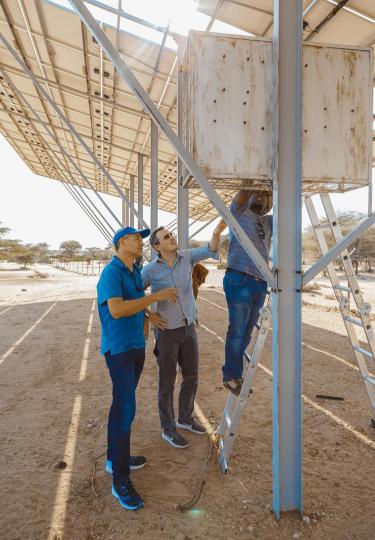What Is Global Engineering?
Global Engineering, sometimes referred to as humanitarian engineering, or sustainable development engineering, envisions a world in which everyone has equitable access to safe and reliable water, sanitation, energy, food, shelter and infrastructure, and can live in health, dignity, and prosperity.

Mortenson Center students installing real-time E. coli monitoring sensors on Boulder Creek.
At the Mortenson Center CU Boulder, choosing a global engineering education means choosing to tackle complex, uncomfortable, and deeply human problems including poverty reduction through engineering. It will stretch you, push you to think differently, and ask more of you than memorizing theories. It will ask for your integrity, empathy and creativity. But it will also reward you. Our alumni are making significant impacts in global development organizations, governments, academia, and social enterprises across the globe. You’re in good company.
The Limits of Traditional Engineering

The Engineer’s role in addressing global poverty has often been confined to village and small community projects, new product creation or large-scale infrastructure design and construction. Yet despite fifty years of these approaches, over half the world’s population still lives on less than $5.50 a day, disease in low-income countries is overwhelmingly caused by environmental hazards, and communities with fewer resources face the highest vulnerability to climate impacts.
Traditional engineering approaches are insufficient to address the global drivers that perpetuate poverty. Products and projects do not fix poverty nor does requiring the poorest people to overcome historical and structural inequalities and injustices.
Rethinking Engineering for Global Impact

Engineers must become activists and advocates and use their professional skills to generate real evidence that drives change and works to rectify inequalities. Global engineers work together with communities on the projects that impact the lives of the most vulnerable and in the most challenging environments combining technical skill with advocacy, evidence, and systems thinking to tackle root causes of inequality.
Ready to Engineer Global Solutions?
CU Boulder Graduate Certificates:
Graduate Certificate in Global Engineering
Online Graduate Certificate in Global Engineering
CU Boulder Graduate Engineering:
Professional Master’s in Global Environmental Engineering
Professional Master’s in Global Resilience & Sustainability Engineering
CU Boulder Undergraduate Engineering:
Minor in Global Engineering
Global Engineering RAP
Read Toward a New Field of Global Engineering by Dr. Evan Thomas, Mortenson Center Director.

